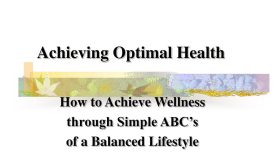Unlocking the Secrets of a Balanced and Healthy Life

Importance of Balance
In today’s fast-paced world, the quest for balance has become more crucial than ever. Striking a harmonious equilibrium among various aspects of life can significantly enhance overall well-being. Whether it’s juggling work commitments, personal interests, or family responsibilities, finding that sweet spot ensures a fulfilling life. Consider Sarah, a marketing executive and a mother of two, who struggled with the demands of her job while trying to engage with her children. By prioritizing balance, she created a routine that included dedicated family time, work hours, and personal hobbies. This shift not only improved her mental health but also strengthened her relationships. Here are some reasons why achieving balance is vital:
- Unlocking the Secrets of a Balanced and Healthy Life
- Importance of Balance
- Physical Health
- Exercise
- Nutrition
- Mental Well-being
- Mindfulness
- Stress Management
- Emotional Wellness
- Self-care
- Relationships
- Work-Life Balance
- Time Management
- Setting Boundaries
- Financial Health
- Budgeting
- Savings
- Social Connections
- Community Involvement
- Social Support
- Spiritual Growth
- Meditation
- Gratitude Practices
- Enhanced Productivity: A balanced lifestyle allows for focused work energy, leading to increased productivity.
- Improved Mental Health: When life is balanced, stress levels decrease, reducing anxiety and depression.
- Stronger Relationships: Investing time in various facets of life fosters deeper connections with friends and family.
True balance is about making intentional choices that prioritize well-being, positively impacting all areas of life.
Physical Health
Exercise
Achieving balance in life begins with maintaining physical health, and exercise plays a colossal role in this journey. Regular physical activity not only strengthens the body but also enhances mental clarity and emotional stability. For example, when James, a software developer, started a daily jogging routine, he noticed a significant boost in his productivity and mood. Engaging in various forms of exercise helps to keep things interesting. Here are some excellent options to consider:
- Cardio: Ranges from running and cycling to swimming, ideal for heart health.
- Strength Training: Using weights or resistance bands to build muscle.
- Yoga and Pilates: Great for flexibility, balance, and reducing stress.
Nutrition
Complementing consistent exercise with good nutrition is essential for overall health. A balanced diet fuels the body, improves energy levels, and supports immune function. Take Amanda, who switched to a plant-based diet; she found her energy skyrocketed and her mood stabilized. To enhance nutritional balance, focus on the following:
- Whole Foods: Incorporate fruits, vegetables, whole grains, and lean proteins.
- Hydration: Drink enough water throughout the day to stay properly hydrated.
- Moderation: Enjoy treats in moderation to avoid feelings of deprivation.
By integrating exercise and good nutrition into daily routines, individuals can foster a robust foundation for their physical health, setting the stage for a more balanced life.
Mental Well-being
Mindfulness
As we delve deeper into achieving a balanced life, nurturing mental well-being is just as crucial as maintaining physical health. Mindfulness, the practice of staying present in the moment, can vastly improve mental clarity and emotional stability. For instance, Lisa, who often felt overwhelmed by everyday tasks, discovered that dedicating just ten minutes a day to mindfulness meditation transformed her outlook. Incorporating mindfulness can be simple and effective. Here are a few ways to get started:
- Breathing Exercises: Focus on your breath for a few minutes to calm the mind.
- Mindful Eating: Savor each bite during meals, paying attention to taste and texture.
- Nature Walks: Engage with nature to enhance awareness of the surroundings.
Stress Management
Along with mindfulness, effective stress management techniques are essential in fostering mental well-being. High stress can lead to burnout, impacting both personal and professional life. Ben found that implementing stress-reducing strategies significantly improved his coping abilities during hectic work periods. Here are some foolproof stress management techniques to consider:
- Time Management: Create to-do lists to prioritize tasks effectively.
- Physical Activity: Engage in stress-relieving exercises like yoga or jogging.
- Social Connection: Share feelings and experiences with friends or family to build a support system.
By embracing mindfulness practices and stress management strategies, individuals can cultivate a more resilient mindset, contributing to overall balance in their lives.
Emotional Wellness
Self-care
Building on the foundation of mental well-being, emotional wellness is a critical component of achieving a balanced life. One of the most effective ways to nurture emotional health is through self-care. This practice varies for each individual; for example, Karen, a busy nurse, realized she needed to dedicate time each week for activities that rejuvenate her, such as painting or unwinding with a good book. Consider these self-care practices to enhance emotional wellness:
- Set Aside ‘Me’ Time: Schedule regular downtime for activities you love—not just chores.
- Engage in Hobbies: Pursue interests that ignite passion and joy, from gardening to reading.
- Practice Journaling: Writing down thoughts and feelings can be therapeutic.
Relationships
Nurturing healthy relationships plays an equally vital role in emotional wellness. Relationships offer support, companionship, and a sense of belonging, which can significantly impact one’s emotional state. Mark found that dedicating time to strengthen his friendships made a world of difference in how he felt during stressful periods. To enhance relationship health, consider these tips:
- Communicate Openly: Share feelings and thoughts with loved ones to foster understanding.
- Show Appreciation: A simple “thank you” or note of appreciation can strengthen bonds.
- Spend Quality Time Together: Plan regular activities or outings with friends and family.
By prioritizing self-care and cultivating meaningful relationships, individuals can enhance their emotional wellness, paving the way for a more balanced and fulfilling life.
Work-Life Balance
Time Management
Transitioning from the importance of emotional wellness, achieving a harmonious work-life balance is essential for overall well-being. Time management plays a pivotal role in this equation. Properly managing time allows individuals to allocate resources efficiently, ensuring personal and professional needs are met. For instance, Angela, a project manager, found that by using time-blocking techniques, she could focus better during work hours and still reserve evenings for family. Here are some effective time management strategies:
- Prioritize Tasks: Use the Eisenhower Box to determine urgent and important tasks.
- Set Specific Goals: Define short-term and long-term goals to maintain direction.
- Utilize Digital Tools: Apps like Trello or Asana can help keep track of tasks and deadlines.
Setting Boundaries
Equally important is the practice of setting boundaries. Boundaries create a buffer for personal time, allowing individuals to recharge and prevent burnout. After experiencing constant work-related interruptions, Mike decided to impose a strict no-work policy after 6 PM, leading to more quality time with his family. To establish effective boundaries, consider these tips:
- Communicate Clearly: Let coworkers know your availability to manage expectations.
- Learn to Say No: Politely decline additional work that intrudes on personal time.
- Create a Dedicated Workspace: If working from home, designate a specific area for work-related tasks to separate work from home life.
By honing time management skills and setting firm boundaries, individuals can nurture a healthier work-life balance, aligning their personal values with professional aspirations.
Financial Health
Budgeting
As we shift our focus to another cornerstone of overall balance, financial health cannot be overlooked. Establishing a sound budgeting practice is vital for managing expenses and achieving financial goals. For instance, when Rachel, a recent college graduate, created her first budget, she was amazed at how much clarity it provided regarding her spending habits. Here are some practical budgeting tips to empower financial decisions:
- Track Expenses: Keep a log of all spending for a month to identify patterns.
- Categorize Spending: Divide expenses into needs, wants, and savings to prioritize effectively.
- Use the 50/30/20 Rule: Allocate 50% of income for needs, 30% for wants, and 20% for savings and debt repayment.
Savings
Once a budgeting plan is in place, the next step is focusing on savings. Building a robust savings strategy can provide peace of mind and financial security. Mark, a family man, realized that even small, consistent contributions to a savings account significantly improved his family’s financial stability over time. Consider these essential savings strategies:
- Set Specific Savings Goals: Whether it’s for emergencies, vacations, or retirement, define clear targets.
- Automate Savings: Set up automatic transfers to savings accounts to build the habit effortlessly.
- Emergency Fund: Aim to save three to six months’ worth of living expenses to cushion against unexpected events.
By budgeting effectively and prioritizing savings, individuals can foster financial health, paving the way for greater overall balance in their lives.
Social Connections
Community Involvement
As we delve into the significance of social connections, we find that engaging with our communities can offer tremendous benefits to overall well-being. Community involvement not only fosters a sense of belonging but also creates meaningful relationships. For instance, when Tom joined a local volunteering group, he was surprised at how quickly he formed bonds with like-minded individuals while making a positive impact. Here are some ways to get involved in the community:
- Volunteer at Local Organizations: Whether it’s a food bank or an animal shelter, find a cause that resonates with you.
- Attend Local Events: Participate in festivals, workshops, or town meetings to meet new people.
- Join Clubs or Groups: Be it a book club, sports team, or hobby group, connecting with others over shared interests can foster friendships.
Social Support
Alongside community involvement, having a solid social support system is crucial for emotional stability. Friends and family serve as a safety net during tough times. After moving to a new city, Jenna realized how vital her social circle was for her emotional health when her friends rallied around her during a challenging period. Consider these ways to cultivate social support:
- Reach Out Regularly: Schedule catch-ups, whether in person or virtually, to maintain connections.
- Be Open and Honest: Share your experiences and feelings, encouraging others to do the same.
- Offer Support: Being there for others strengthens bonds and creates a reciprocal support system.
By investing in community involvement and nurturing social support, individuals can enrich their lives and foster robust connections that enhance their overall balance and well-being.
Spiritual Growth
Meditation
As we complete our journey toward overall balance, exploring spiritual growth can provide deeper insights and fulfillment. One of the most effective practices for fostering spiritual growth is meditation. This ancient technique offers a pathway to mindfulness and self-discovery. For example, when David began meditating for just ten minutes daily, he noticed a profound shift in his perspective toward life’s challenges, allowing him to respond with a calmer demeanor. To incorporate meditation into your life, try these simple tips:
- Start Small: Begin with just a few minutes a day and gradually increase the duration.
- Find a Quiet Space: Choose a peaceful environment to enhance focus and reduce distractions.
- Explore Different Types: Experiment with guided meditations, breath-focused practices, or loving-kindness meditation to find what resonates with you.
Gratitude Practices
Another impactful way to nurture spiritual growth is through gratitude practices. Taking a moment each day to reflect on what one is thankful for can shift focus from negativity to positivity. Sarah, who started journaling her daily gratitudes, found herself feeling more content and connected to her life’s blessings. Consider these gratitude practices to enhance spiritual well-being:
- Gratitude Journaling: Write down three things you’re grateful for each day to cultivate a positive mindset.
- Express Appreciation: Share your thanks with others in person or through notes, strengthening relationships.
- Create a Gratitude Jar: Regularly add notes of appreciation to a jar, and review them at the end of the year for reflection.
By embracing meditation and gratitude practices, individuals can foster spiritual growth that enriches their lives, providing a profound sense of balance and purpose.





